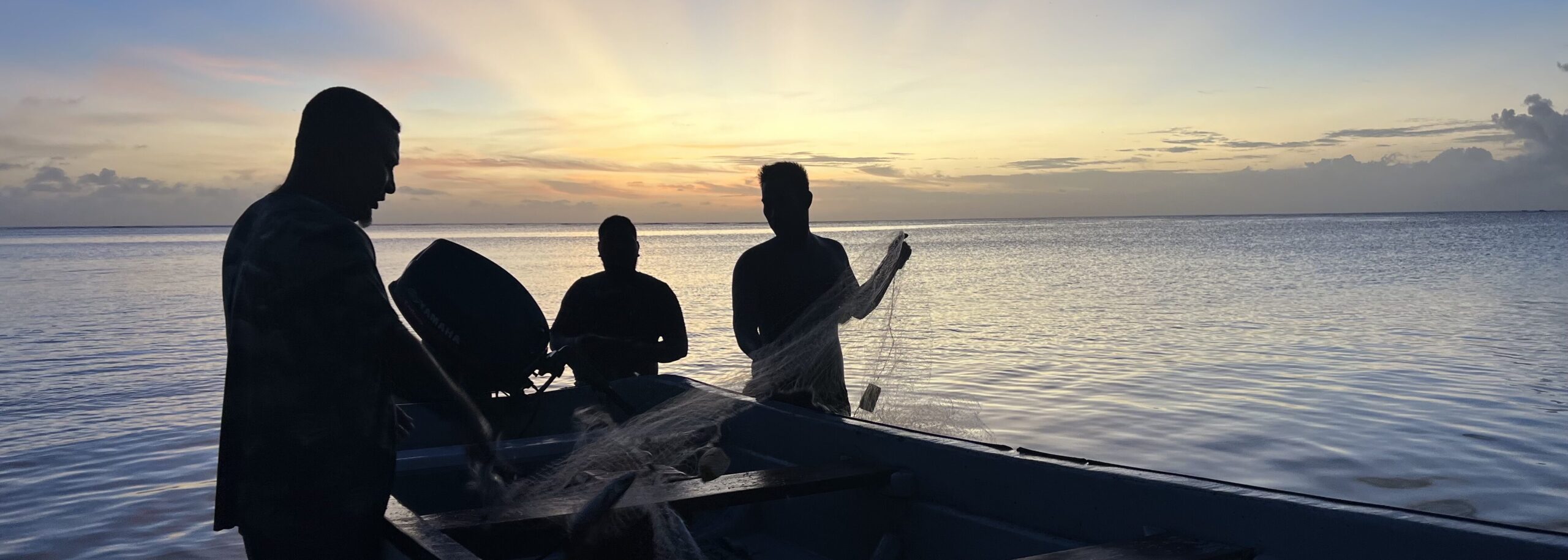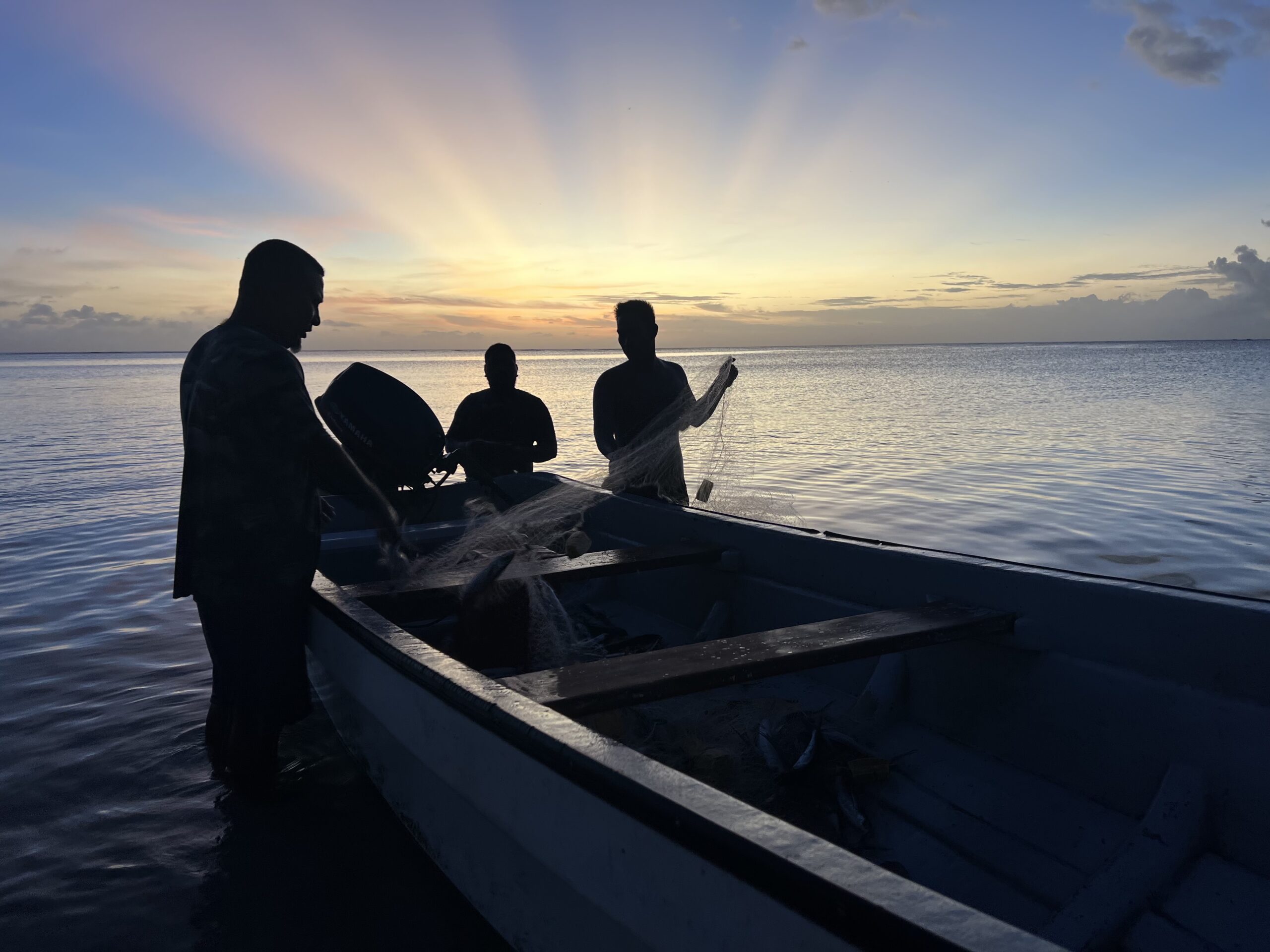Published: 02/10/2025
Image credit: Fishers from Kiribati on the island of Kuria, courtesy of Christopher Knight, Stanford. Seafood is vital for communities in the Pacific Island nation of Kiribati, where ciguatera fish poisoning threatens access to safe food.
Timeline
- Call for Proposals Opens: February 10, 2025
- Deadline for Submissions: March 28, 2025
- Notification of Selections: May 16, 2025
- Funding Period: June 15, 2025– December 15, 2026
Purpose
The Stanford Global Health Seed Grant program encourages the development of innovative solutions to global health and planetary health challenges. It supports scientific and clinical research, implementation science, and development of new innovations in health care implementation or delivery. The program seeks to enable Stanford’s vibrant global health community, support global health training opportunities for Stanford trainees and students, and build capacity with international partners. Research projects that have strong potential to generate solutions and impact, and/or scale-up into larger initiatives are encouraged to apply.
The Center for Innovation in Global Health believes that local is global. We are committed to improving health equity among all populations, including vulnerable communities in the United States.
Program Priority Areas
Preference will be given to research teams that include more than one discipline (another department or school) and reflect the Center for Innovation in Global Health’s major initiatives and funders’ priorities:
- Global Health: Interdisciplinary, solutions-oriented research that seeks to improve health in low-resourced settings
- Human and Planetary Health:
- Research that addresses the health implications of climate change or other forms or environmental degradation
- Global Maternal and Child Health: Projects that seek solutions to improve maternal and child health in low-resource settings
- Global Emergency Medicine: Projects that support innovative research in emergency medicine in low-resource settings
- Global Surgery: Projects to develop or support educational programs, research, or innovations that improve global surgical care
- Global Ophthalmology: Projects that support research to improve global eye health
- Local community engagement: Solutions-oriented, community-driven research to support climate resilience by preventing and mitigating environmental harms and improving access to a healthy and safe environment for immigrant or indigenous communities, preferably in the Bay Area or California
- Global Pediatric Palliative Care: Projects that support innovative research in pediatric palliative care in low-resource settings
- Anesthesiology, Perioperative, and Pain Medicine: Projects that support educational programs, research, or innovations to improve global anesthesiology, perioperative, critical care, and pain medicine
- Pathology: Projects that support innovative research in pathology in low-resource settings
Eligibility
All Stanford Faculty with PI eligibility may apply. This call is open to Faculty from all seven schools. Post-doctoral fellows, clinical trainees, instructors, and research scientists/scholars must identify a faculty mentor and then may be included as co-PIs.
Projects that create new interdisciplinary collaborations are encouraged. Teams may include investigators in off-campus partner institutions, including in low- or middle-income countries. Teams may also partner with nonprofit organizations, industry, or government officials.
* At this stage, you do not have to prepare a PIF, a PDRF form, or work with your institutional representative (RPM or OSR).
Amount of funding
$10,000 – $50,000 for 18 months
We encourage investigators to consider submitting requests less than the maximum, as this will enable us to award more grants.
Budget Guidelines
Award amounts are based on analysis of a detailed budget request.
- Funds may be used for salary support of graduate students, postdocs, and other research staff. (Faculty PI support is not allowable.)
- Eligible budget items include: operating supplies, equipment items, communications expenses, meeting costs, prototyping expenses, imaging time, and travel directly associated with the research activity.
- The grants will not support general (non-research-related) staff, administrative support, or tuition.
- No indirect charges need be included in your budget.
Submission Guidelines
All documents should be in pdf format, single-spaced, Arial 11-point font, with one-inch margins. Submissions must not exceed 3 pages, exclusive of cover page, citations, budget, and biographical information.
Each proposal must include:
- Cover page with project title, one-paragraph summary, and each team member’s name, email, professional title, and department and school affiliation(s)
- Proposal
- Introduction
- Specific aims
- Preliminary data (if available)
- Proposed project design and methods
- Collaboration plan: how will the multi-disciplinary team work together; what is the history of your relationship with any external / community partners?
- Description of potential for impact and follow-on funding
- Supporting material
- Literature cited
- Itemized budget with brief budget justification
- Short (150 words max) bio-sketches for team members including faculty PI
Selection Criteria
The Stanford Center for Innovation in Global Health and funders will review proposals based on:
- Scientific merit of the proposal, with quality, innovation and creativity balanced by likelihood of success
- Interdisciplinary nature of the project and research team, including international collaborations where appropriate
- Likelihood that results or solutions will lead to improved health among vulnerable populations
- A persuasive case that results would lead to scale-up, and/or catalyze further funding from external sources
- Involvement of Stanford trainees and/or students; global health career development
- Alignment between the proposal’s goals and the program priority areas (outlined above)
- Demonstration of equitable, bilateral research partnerships*
Funders include the Stanford Center for Innovation in Global Health, the Woods Institute for the Environment, the Maternal and Child Health Research Institute, Office of Community Engagement, School of Medicine (SOM) Dean’s Office, the SOM Departments of Anesthesiology, Perioperative, and Pain Medicine, Emergency Medicine, Medicine, Ophthalmology, Pathology, Pediatric Palliative Care, and Surgery.
Key Dates:
- March 28, 2025: Proposals due.
- May 16, 2025: Award letters are sent out.
- June 15, 2025: Grants begin. Awards will be for 18 months or less. All grantees are eligible for one no-cost extension if necessary.
Research Administration and Reporting Requirements:
Once grants are awarded, the project team must submit a PDRF form via SERA to set up their seed grant PTA. If research includes human subjects, projects will need to obtain IRB approval prior to incurring any costs related to the human subjects phase of research.
All grantees must submit annual progress reports by December 1, and a final report 45-days after the work has been completed. At the conclusion of their research, all seed grantees must also apply to present their funded research at the annual Stanford Global Health Research Convening, typically held every January.
Questions?
Contact: S. Jill Mueller: sjillmueller@stanford.edu
* See checklist for bilateral research partnerships (Figure 1) in this paper: Hodson DZ, Etoundi YM, Parikh S, Boum Y II (2023) Striving towards true equity in global health: A checklist for bilateral research partnerships. PLOS Glob Public Health 3(1): e0001418. https://doi.org/10.1371/journal.pgph.0001418

